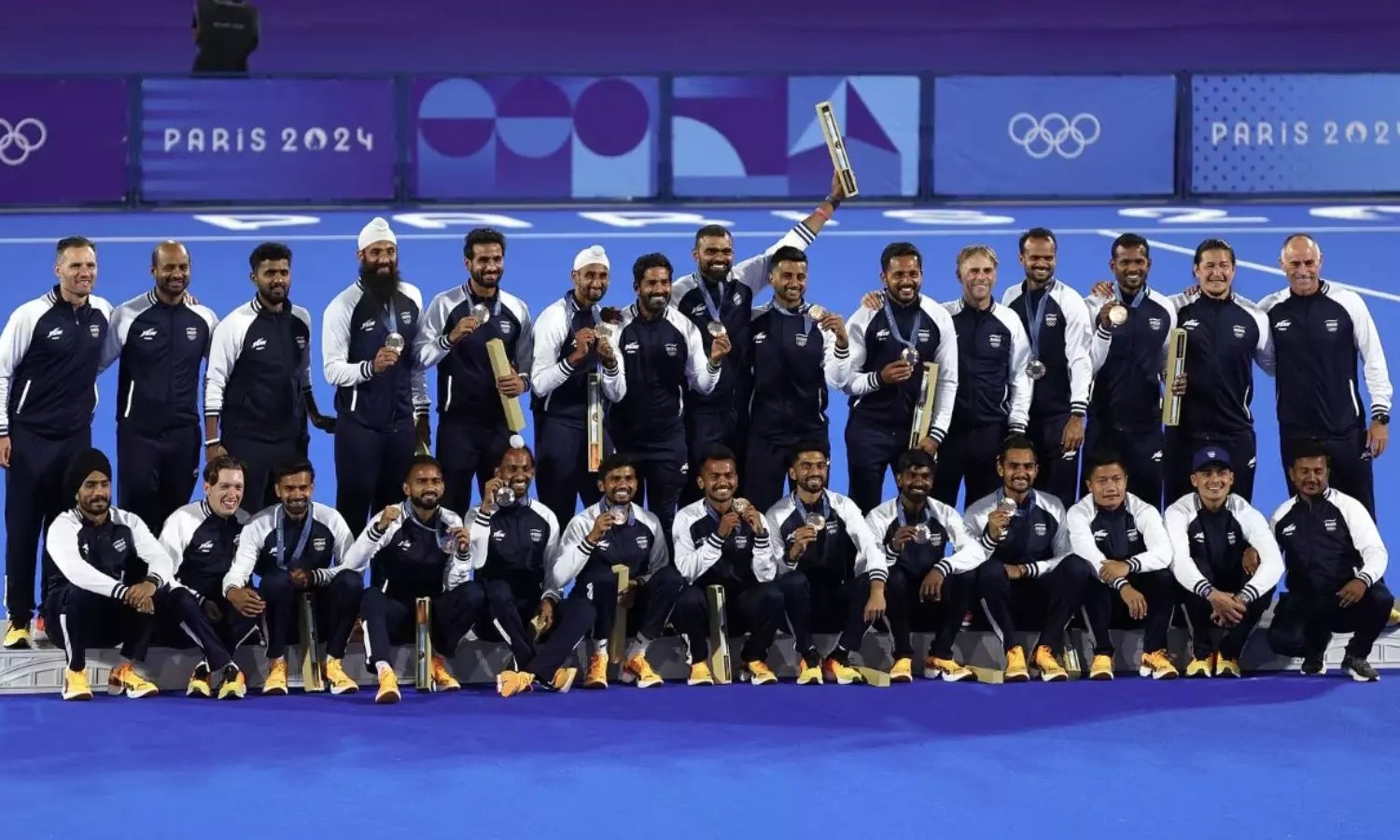Hockey
How escaping 'sure death' in the Alps helped India to win 2nd Olympic medal in a row
Mental conditioning coach Paddy Upton had put the Indian hockey players through rigorous high-altitude training in the Alps before the Paris Olympics.

The Indian men's hockey team won their second successive Olympic medal at the Paris Olympics 2024. (Photo credit: @FranceinIndia/X)
The Indian men's hockey team won their second successive medal at the Paris Olympics 2024, for the first time in 52 years.
After putting up a brave and resolute performance throughout the Games, India won the bronze medal. This was their second medal in a row after the Tokyo Olympics in 2021.
The last time, India won their second successive medal in the Olympics was in Munich in 1972.
While coach Craig Fulton played a pivotal role in India's history-making showing in Paris by executing his nuanced strategies, another South African man played an equally important role in paving the way for India's podium finish in Paris.
Paddy Upton's masterstroke
The man behind India's manful composure and 'never-say-die' attitude of the team was the mental conditioning coach Paddy Upton, whose measured planning and execution before the Paris Olympics turned out to be the game changer.
Upton, a South African coach with a proven track record in Indian sports, took the Indian hockey team to the Alps in Switzerland for a three-day high-altitude training that enhanced Indian players' stamina and team bonding.
But before the start of the camp, he had kept his objectives secret.
In a recent LinkedIn post, sharing his thoughts on the training, he shared 'some insights into Team India's three-day pre-Olympic training camp in Switzerland, what we did and some of the reasons why players and coaches arrived with no idea what they would do, where they would stay or how they would travel around the Alps."
He put the Indian players' mental fortitude to an intense test by pushing them on the edge of 'sure death'. Upton wanted the players to find a way to save each other and bring themselves out of danger. It improved team bonding and their ability to fight back when they were cornered in the match.
This was important for the team since they headed to the Olympics following a dismal FIH Pro League campaign, where India finished seventh.
His well-measured training method paid dividends. What was meant to save lives in the Alps, in the Olympics that training turned out to be a medal clincher for India.
The Indian players showed tremendous mental strength and courage during the Olympics in Paris.
They were impeccable in defending and showed great composure in regrouping. When they launched counterattacks, they came in from all sides, rattling the opponents' defence.
The Men in Blue did not concede more than two goals till the quarterfinals and beat their bogey teams like Australia and Great Britain en route to the semifinals.
Uplifting the morale and fitness
In their sturdy defensive play, India showed a tremendous fitness level.
Upton worked hard to uplift the morale of the players.
Speaking of how they reached the Alps and what they did there, Upton said, "After an introduction from host Mike Horn (motivational coach), the players took a cable car to the highest point in the gestalt area."
"As an introduction to the training we do at altitude as well as to formalise and get comfortable with cold as well as heights we would be at. Mike gave one of his talks after we progressed further into the Alps, climbing down a narrow ridge and out onto a glacier where snow covered ancient and dangerous crevasses," narrated Upton.
Explaining the danger quotient of training in the Alps, he said, "Team members were roped into groups of six so that if one player fell, the other five could arrest and recover their fall. At one point, failing down one side of the slopes, as seen later in this video was safe. What's not seen was that if players fell down the other side of that same slope, it would have meant their sure death.
"Day one was about having fun, deepening team bonding, and learning what it means to be roped in together. The idea was to help the team understand how to march to the top together, to ask for and receive support, and to lay plans for what we do when the inevitable shift happens in the Olympics. How would we keep our heads, focus on the job, and navigate our way out of trouble? Importantly without blame and excuses," stated Upton.
Such rigorous training turned out so well in the end.
Even when they went down, India displayed remarkable mental strength to make a comeback and snatch away the lead.
India came agonisingly close to playing in the final but lost to Germany in the closing minutes of the semifinal.
Under the leadership of Harmanpreet Singh, India fought hard against world champions Germany in every aspect of the game. But a last-quarter goal by Germany from almost no angle pulled India down.
Despite the heartbreak of missing out on a chance to play in the final, India beat a spirited Spanish side 2-1 to claim the bronze medal.
